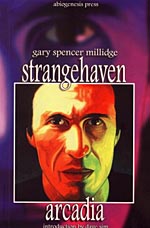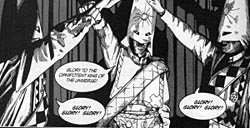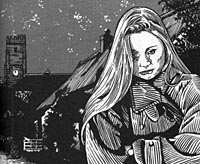>> The Friday Review: Pubo
>> The Friday Review: Get Your War On
More...

 Writer/Artist: Gary Spencer Millidge
Writer/Artist: Gary Spencer Millidge
Price: $14.95
Publisher: Abiogenesis Press
ISBN: 0-946790-04-3
It's a tall order, but someone had to attempt it sooner or later. I'm going to try and write a review of STRANGEHAVEN without making reference to THE PRISONER, TWIN PEAKS or even THE DARLING BUDS OF MAY.
Well, from here on in I am, anyway.
As anyone who's ever travelled knows, it's frequently not the ultimate destination that makes the trip worthwhile, but rather the journey itself. STRANGEHAVEN is like this as well. Issue one first appeared back in 1995, and in the intervening years we've notched up just fourteen episodes, during which time the central plot has advanced at what can charitably described as a snail's pace. Often billed (somewhat inaccurately, it has to be said) as a 'murder mystery', no one is actually even killed until #12 (and that might well turn out to be a suicide, anyway).
None of this matters, though. STRANGEHAVEN is a journey, and a singular and rewarding one at that. As we travellers know, journeys of this kind need to be savoured and not hurried along; a philosophy to which STRANGEHAVEN creator Gary Spencer Millidge clearly subscribes as well.
STRANGEHAVEN begins when discontented Home Counties refugee Alex Hunter runs his car off the road late at night somewhere in the West Country, narrowly avoiding a ghostly female figure that appears on the road in front of him. He awakes the following day in the town of Strangehaven - a quaint English village inhabited by an unusual but generally likeable collection of eccentrics and other odd-folk.
While the unusual circumstances of Alex's arrival and the recurring image of a dead woman floating in a fish tank point to something sinister going on in the village, it quickly becomes apparent that Strangehaven possesses a certain odd charm all of its own - and Alex soon falls under its spell. By the time he discovers he can't seem to leave town without getting hopelessly lost in the quiet country lanes that surround it, Alex isn't even sure whether he wants to leave anymore.
 Taking up a teaching position at the local school, Alex settles comfortably, albeit a little gingerly, into village life. Meanwhile, a quasi-Masonic secret society meets by moonlight to discuss the newcomer, and a displaced South American shaman inducts a village youth into the mysteries of Amazonian tribal culture...
Taking up a teaching position at the local school, Alex settles comfortably, albeit a little gingerly, into village life. Meanwhile, a quasi-Masonic secret society meets by moonlight to discuss the newcomer, and a displaced South American shaman inducts a village youth into the mysteries of Amazonian tribal culture...
Beautifully crafted and constructed, ARCADIA, the collection of the first six issues, potters along at a patient, idyllic pace, taking in the full spectrum of village life, focusing on intrigues both major and minor. Yes, there's a central plot, and yes, Alex is very much the reader's point of view character; but you soon realise that there's a wealth of stories to be told in Strangehaven - some of which link to the main plot and some of which don't.
The most obvious comparison is with soap opera, as Millidge chronicles the lives of the villagers in a series of short, overlapping episodes, around which the 'main' plot serves as an anchor or focus. Revolving for the most part around mundane, everyday events and conversations, STRANGEHAVEN is wonderfully low-key and naturalistic, and Millidge's brilliantly observed characters take on a real life of their own.
Despite this, STRANGEHAVEN is no kitchen-sink drama. Steeped in mysticism and strangeness, it strongly recalls the work of the magical realists and neo-romantics. Awash with references to folklore, mythology and the supernatural, Millidge creates and maintains a powerful sense of otherworldliness that somehow manages to be perfectly in tune with the mundane setting. Even the title of this first collection - Arcadia - is a reference to the pastoral paradise of antiquity beloved of the romantic poets, famously captured in Nicolas Poussin's slightly sinister classical representations (which in turn evoke the mysteries of the Grail and Rennes-le-Chateu).
 In the telling of this tale, Millidge creates a rich sense of atmosphere and milieu, and while the book tips its hat to a number of different antecedents in both comics and other media, it nevertheless retains its own unique, distinctive identity.
In the telling of this tale, Millidge creates a rich sense of atmosphere and milieu, and while the book tips its hat to a number of different antecedents in both comics and other media, it nevertheless retains its own unique, distinctive identity.
One of the few criticisms levelled at STRANGEHAVEN in the past has been of Millidge's highly detailed photo-realistic art, which occasionally has the effect of making his characters look a little lifeless and stiff. While this might be true of the first few issues, however, Millidge has continued to improve and evolve his style towards a more 'organic' look, something that is clearly visible even in this first collected edition.
Millidge's choice of style isn't an arbitrary one, either. It's particularly well suited to the quiet, unshowy nature of the story, where so much is conveyed through the idiosyncrasies and body language of his keenly observed characters. Millidge has a wonderful eye for gestures and mannerisms, and a more exaggerated style would destroy many of the subtleties he manages to portray.
Enforcing a rigid nine-panel grid on the main narrative, Millidge only allows it to bleed out into the page during the painted sequences. He varies from his usual pen-and-ink during flashbacks, or when a character stops to tell a story within the story; the implication being that the world of dream and fantasy has a richer, deeper texture than real life. That contrast strikes me as being particularly appropriate in the case of this comic.
I first encountered STRANGEHAVEN not long after it was first published, and I've followed it ever since. I've been through a lot of changes during that time, and been on many different journeys. I'm a long way from that Birmingham comic shop where I picked up that copy of STRANGEHAVEN #1, but I'm always glad to see the journey I begun there hasn't ended yet. Hopefully I'll be savouring it for a long time to come yet.

This article is Ideological Freeware. The author grants permission for its reproduction and redistribution by private individuals on condition that the author and source of the article are clearly shown, no charge is made, and the whole article is reproduced intact, including this notice.


